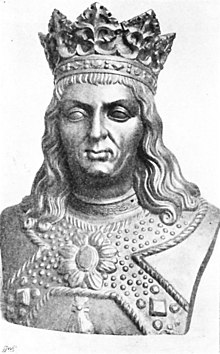John I Albert
| John I Albert | |
|---|---|
 Tomb effigy from Wawel | |
| King of Poland | |
| Reign | 7 June 1492 – 17 June 1501 |
| Predecessor | Casimir IV Jagiellon |
| Successor | Alexander I |
| Born | 27 December 1459 Kraków, Poland |
| Died | 17 June 1501 (aged 41) Toruń, Poland |
| Burial | Wawel Cathedral, Kraków |
| Dynasty | Jagiellon |
| Father | Casimir IV of Poland |
| Mother | Elisabeth of Austria |
| Religion | Roman Catholic |
John I Albert (Polish: Jan I Olbracht; 27 December 1459 – 17 June 1501) was King of Poland (1492–1501) and Duke of Głogów (1491–1498).
Early life and succession[]
John was the third son of Casimir IV, King of Poland, and Elisabeth, daughter of the elected king of Germany, King Albert of Hungary, Croatia and Bohemia, who died when she was two years old. As the granddaughter of the late Emperor Sigismund, she was raised by Emperor Frederick III. As crown prince, John distinguished himself by his brilliant victory over the Tatars at (1487). In 1490, the Hungarian nobility proclaimed John King of Hungary at the diet. He was, however, defeated by his brother, King Vladislaus II of Hungary. In 1492, John succeeded his father as King of Poland thanks to the key intervention of his brother Friedrich Jagiellon, archbishop of Kraków and archbishop of Gniezno. Friedrich achieved the coronation of John. However, losses of revenue due to the secession of Lithuania placed John at the mercy of the Polish sejmiks, or local diets, where the szlachta, or local nobles, made their subsidies dependent on the king's subservience.
Plans against the Turks[]
This article includes a list of references, related reading or external links, but its sources remain unclear because it lacks inline citations. (February 2013) |
John desired to pose as the champion of Christendom against the Ottoman Turks. Circumstances seemed, moreover, to favor him. In his brother Ladislaus, who as King of Hungary and Bohemia possessed a dominant influence in central Europe, he found a counterpoise to the machinations of Emperor Maximilian I, who in 1492 had concluded an alliance against him with Ivan III of Muscovy. As suzerain of Moldavia, John was favorably situated for attacking the Turks. At the conference of Leutschau (1494), the details of the expedition were arranged between the kings of Poland and Hungary and Elector John Cicero of Brandenburg, with the co-operation of Stephen III of Moldavia, prince of Moldavia, who had appealed to John for assistance.
In the course of 1496 John collected an army of 80,000 men in Poland with great difficulty, but the Poles entered Moldavia not as friends but as foes, and after the abortive siege of Suceava were compelled to retreat following defeat at the Battle of the Cosmin Forest. The insubordination of the szlachta seems to have been one cause of this disgraceful collapse, for John after his return confiscated hundreds of their estates.
Issues with Teutonic Knights and death[]
When the new Grand Master of the Teutonic Knights, Friedrich Wettin von Sachsen, refused to render homage to the Polish crown, John compelled him to do so. His intention to still further humiliate the Teutonic Order was stymied by his sudden death in 1501.
See also[]
| Wikimedia Commons has media related to John I Albert of Poland. |
References[]
- V. Czerny. The Reigns of Jan Olbracht and Aleksander Jagiellon. Kraków, 1882. (in Polish)
This article incorporates text from a publication now in the public domain: Chisholm, Hugh, ed. (1911). "John Albert". Encyclopædia Britannica. 15 (11th ed.). Cambridge University Press. p. 458.
- 1459 births
- 1501 deaths
- 15th-century Polish monarchs
- 16th-century Polish monarchs
- Polish Roman Catholics
- Nobility from Kraków
- Jagiellonian dynasty
- Burials at Wawel Cathedral
- Pretenders to the Hungarian throne